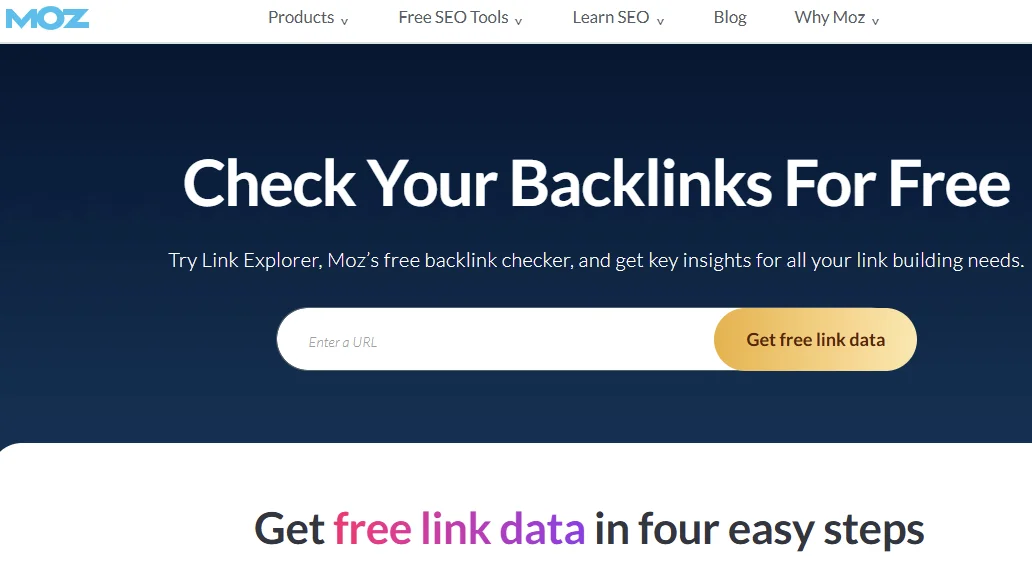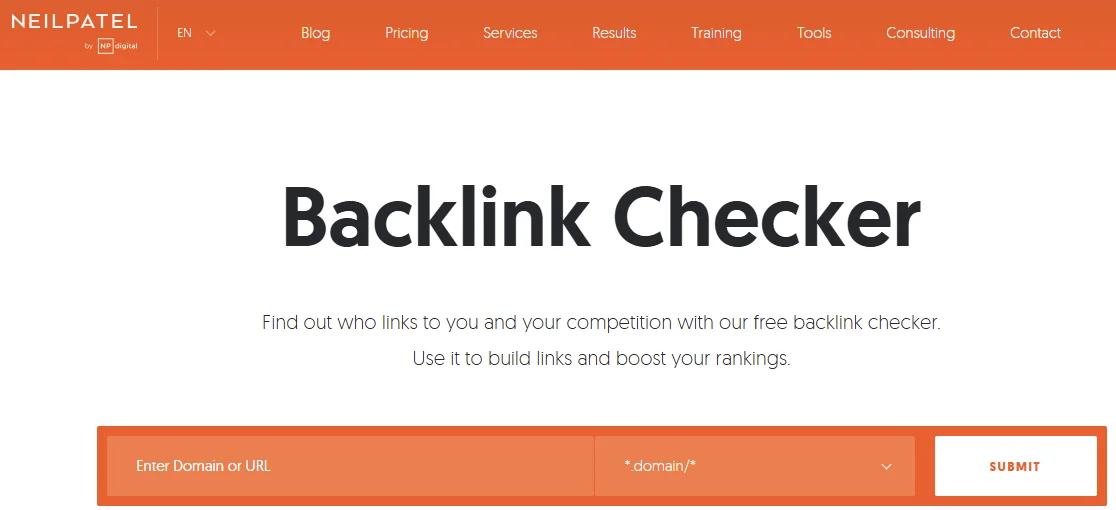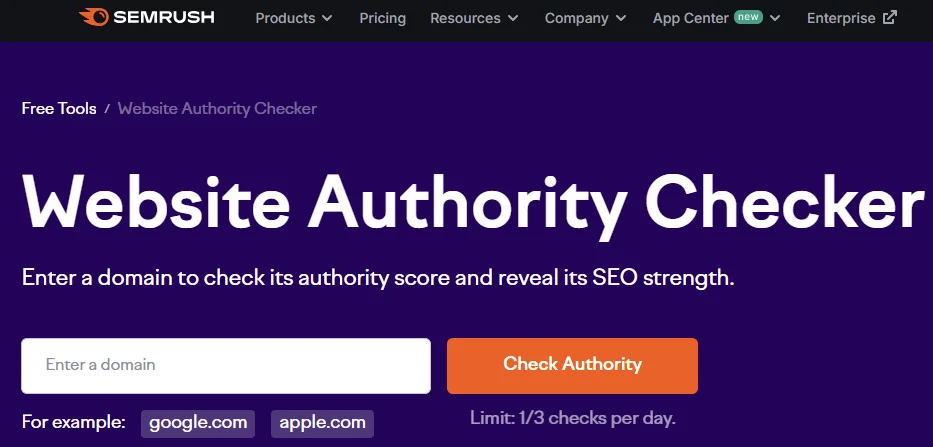
Have you noticed how some websites consistently appear on search engine results pages while others barely show up at all?
Domain authority, or DA, is one of the key reasons for this, and the good news is that you can improve this metric to increase your chances of populating search results pages.
In this guide, you'll learn what DA means, how it's calculated, and simple ways to raise your score. You'll also find practical steps to build stronger authority through smart link-building.
Let's get started.
Domain authority, or DA, is a predictive SEO score that shows how strong your website is in search engines.
The score predicts how likely your site is to rank higher on SERPs (search engine results pages).
Developed by Moz, Domain Authority is not a direct ranking factor for Google. Instead, it's a comparative metric that helps you compare the search strength of your website to others in your niche.
A website with a high DA usually has helpful web pages and strong off-page SEO, including backlinks.
Your website’s Domain Authority score can range anywhere between 1 and 100, depending on several factors.
You can check the score at any time using a domain calculator. More on this later.
Special Note: Our AI-powered Link Engine Strategy analyzes your competitors' backlink profiles to show you exactly where you stand and what links you need to close the gap.

Now that you know what Domain Authority means, let's see how it differs from other similar metrics like Page Authority and Domain Rating.
Domain Authority shows the overall strength of your website and is based on the quality, relevance, and variety of backlinks pointing to your domain.
Page Authority, or PA, measures the ranking power of a single web page. The metric helps you understand which pages are strongest and where you can improve internal linking.
Domain Rating, or DR, analyzes your website's backlink profile, much like DA, but it uses a different calculation method.
Here's a simple, quick tabulated comparison of the three:
It's best to consider all three scores together to get a clearer picture of your site's link health and help you plan link-building strategies that improve real results, not just numbers.

Understanding these different metrics helps you see why Domain Authority is such an important part of SEO. A strong DA shows both search engines and users that your website can be trusted.
Here's a finer look at why DA matters:

Generally, a higher Domain Authority score is better. However, instead of evaluating the goodness of a DA score in absolute terms, it's best to consider it relatively.
Domain Authority is relative, since it compares to other websites. As such, it's not ideal to say that a DA of 40, 50, or 70 is the best.
If your DA score is higher compared to similar websites within your niche or industry, it's good.
We've already mentioned that Domain Authority is a metric from Moz. But how does it calculate it?
Moz calculates DA using a special algorithm that studies how your website interacts with the rest of the web.
The algorithm considers factors such as the number of websites linking to you, the quality of those links, and your site's spam score.
The quality of your backlinks matters more than the total number you have. A few strong, relevant links from trusted sites can help your DA more than hundreds of random or low-quality links.
Moz’s system uses machine learning to compare your site with thousands of others in search results, which helps it estimate the likelihood of your site ranking compared to similar websites.
Remember, while DA is not a Google ranking factor, improving your link profile for DA also boosts your real-world SEO results.

Before you plan new link-building actions, it helps to know where your website stands in the present. You can use various simple online tools to check and monitor your DA over time.
Tracking your DA links over time helps you see how your link-building work is improving your site's authority.
Let's check out some common tools you can use:

Also created by Moz, Link Explorer is the most common tool for checking Domain Authority.
You can always use it if you have a free Moz Community account, which allows you to conduct 10 free searches per month.
With this tool, you can see your DA score, anchor text analysis, top content based on popularity, spam score, page authority, and how your site compares to competitors.
You can also see the number of inbound links, linking domains, and follow vs. nofollow links.

With Ubersuggest’s free Backlink Checker, you can see your website's Domain Authority, number of referring domains, new and lost referring domains, number of backlinks, anchor text distribution, and Page Authority.

While Moz’s Link Explorer checks Domain Authority in its literal sense, SemRush checks Authority Score, considering it as equivalent to Domain Authority as part of the overall website authority.
Semrush utilizes its Website Authority Checker to determine the Website Authority of a particular domain, based on the quantity and quality of backlinks, organic traffic, spam factors, and referring domains.
With this checker, you can see your website's Authority Score, number of backlinks, and referring domains, and the top pages on your site based on referring domains.
From the foregoing, we've established that your Domain Authority score depends on several key elements that define how strong your website appears to search engines.
Your website's Domain Authority depends on the core areas below:
Generally, a safe, strategy-led link acquisition process can help strengthen all these factors together to build lasting authority. Doing so yourself takes a long time, but working with a reputable link-building company helps you achieve better results faster.
At Profit Engine, we specialize exclusively in strategic link building using manual outreach and AI-powered analysis, ensuring you acquire a high number of backlinks from trusted domains.
Our AI-driven, strategy-led system ensures you gain relevant, high-value backlinks that grow your DA steadily. We ensure your backlink profile has no spam or PBN links that could lead to penalties.
We also focus on building cohesive links instead of acquiring them at random.
Grab your personalized link-building strategy today.

It’s important to note that before building links, you should start with a data-driven strategy. Ensure you spy on your competitors' backlink profiles to identify high-impact opportunities for your own website.
With a good data-driven strategy and based on the core factors above, you can boost your site's Domain Authority in several ways:
While it's possible to grow your backlink profile organically, the process can be slow. You can get faster results if you actively build high-quality, relevant, and safe backlinks.
Focus on white-hat backlink strategies such as guest posts or niche edits while prioritizing quality over quantity.
Your ultimate goal is to gain backlinks that fit naturally within your content and avoid black-hat techniques that could lead to penalties or sudden drops in traffic.
A healthy backlink profile includes links from multiple unique referring domains.
You'll want to show search engines that your site is trusted across different platforms, including niche-relevant blogs, media outlets, and directories or resource pages.
HARO link acquisition is particularly powerful when it comes to gaining authoritative, diverse links from multiple media outlets.
Strong internal linking helps distribute link juice and equity across your website, which strengthens both high- and low-authority pages.
Ensure you link to relevant internal pages using descriptive anchor text that matches the content on the linked page naturally.
Proper internal linking improves Page Authority while indirectly boosting your overall Domain Authority.
Even the best link-building campaign needs a strong foundation.
Search engines reward sites with helpful, relevant content that satisfies user intent.
You'll want to keep your content informative, current, helpful, and optimized for target keywords to encourage more organic backlinks.
Spammy and low-quality backlinks drag down your Domain Authority.
You can use Ahrefs and Google Search Console to audit your backlink profile and find toxic backlinks before they cause SEO damage.
Ensure you disavow spammy or irrelevant links regularly to maintain a clean link profile.
When it comes to improving Domain Authority, consistency and the right link building tools are key.
You can adopt a long-term link-building roadmap based on your industry, competitors, and goals to create sustainable DA growth while staying 100% Google-safe.
It's best to work with a reliable link-building company to analyze link gaps in your existing system.

Let's tackle some of the most common questions about Domain Authority:
Not usually. DA typically grows gradually as you earn quality backlinks.
As a new site, you can improve more quickly by focusing on strategic, niche-relevant link-building from the outset.
A nofollow backlink can indirectly impact DA. While it doesn't pass link equity, it diversifies your link profile, which is good for overall SEO health.
Neither is inherently better: they are just different metrics from different tools. What matters is your overall backlink quality rather than the label of the score.
To sum up, what matters most is building a strong, trustworthy site that ranks well and drives real results.
You should view Domain Authority as a benchmark against your competitors, rather than a goal itself.
Your link-building efforts to boost your DA should focus on safe, strategic links from white-hat techniques such as niche edits, guest posting, HARO mentions, and tiered links.
Want to grow your site's authority naturally and sustainably using these tactics?
Reach out to us at Profit Engine for a customized link-building roadmap tailored to your goals and needs.